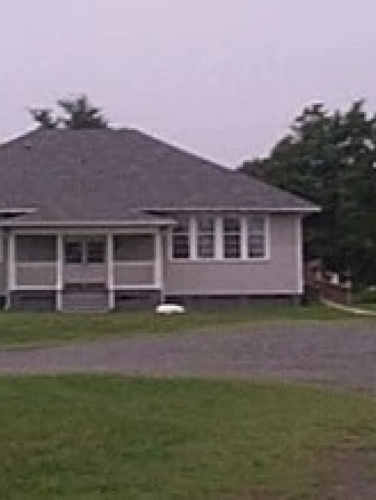
McClintock Rosenwald School
(ca. 1922)
One of Mecklenburg County’s six surviving Rosenwald schools, the McClintock School educated generations of African American children while symbolizing local resistance to segregation.
14008 Erwin Rd, Charlotte, NC 28273
As the result of early twentieth-century Jim Crow laws and segregationist policies, African American children across the United States suffered vast disparities in educational opportunities. Segregated public schools for African American students were often inferior to and lacked the services and facilities of schools for White children, creating roadblocks for social mobility and equal opportunity. In response, Sears-Roebuck president Julius Rosenwald and Tuskegee Institute founder Dr. Booker T. Washington formed a collaborative effort to improve public elementary education for rural African American students. From the 1910s to the 1930s, the Julius Rosenwald Fund operated as a unique and successful private/public partnership, combating educational inequalities by aiding in the construction of approximately 5,400 public schools for African American children. Over 800 Rosenwald schools were constructed in North Carolina, including twenty-six built in Mecklenburg County between 1918 and 1929. The McClintock Rosenwald School is now one of the county’s six remaining Rosenwald schools.
Property Quick Links
Located in the former Steele Creek township, the McClintock School is one of Mecklenburg County's best-preserved Rosenwald schools. Built in 1922, the school is located next to McClintock Presbyterian Church, one of the county's most historic Black congregations. The original circa 1866 church building still stands, although it has been significantly altered over the years. The church was one of the original four churches (including the similarly rural Murkland and Woodland Presbyterian Churches and the downtown Seventh Street Presbyterian Church) in the Catawba Presbytery, the first all-Black presbytery established by the Presbyterian Church, U.S.A. In March 1922, the Mecklenburg County School Board purchased a parcel of land near the McClintock church for the new school for $225. Over the summer the school building was erected. The school’s design was adapted from the standard “Three Teacher Community School” floorplan featured in the Rosenwald Fund's 1924 booklet Community School Plans. The interior closely followed the Rosenwald prescription of three classrooms, one industrial room, and several cloakrooms, all opening off a short corridor. Local builders improvised on the exterior, using a high hip roof rather than the suggested gable, substituting a wide porch for the plan’s gable-roofed recessed vestibule, and lighting each classroom with four banks of windows rather than the suggested five banks. One of the county’s largest Rosenwald schools, McClintock was a four-teacher facility, requiring that the eight grades be doubled up.
All Rosenwald schools were centers of small rural Black settlements. But as Mecklenburg County became less agrarian and the county’s school system began consolidating its numerous rural schools into larger schools – the McClintock School merged into the Pineville School in 1952 – many of those rural Black communities disappeared. The tenant farms that once clustered near the McClintock School are gone, leaving only the church, cemetery, and school in the midst of the fields near NC49. In 1954, the McClintock Presbyterian Church purchased the school for use as a fellowship hall. The building remains in use virtually unchanged to this day even as its parishioners, many of whom are descendants of the former tenant farmers, now drive from homes in Charlotte to worship each Sunday.

